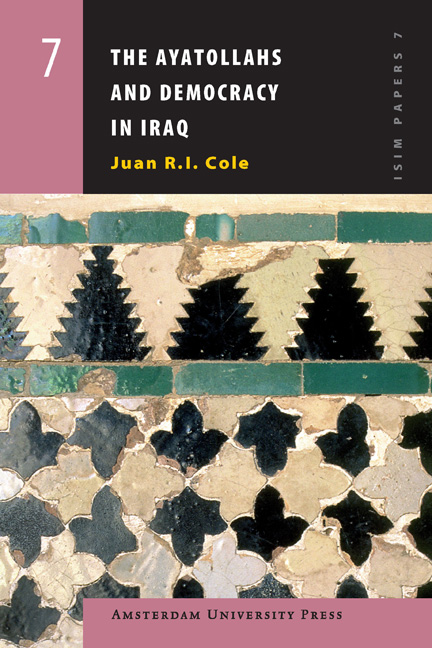The Ayatollahs and Democracy in Iraq
Published online by Cambridge University Press: 28 January 2021
Summary
Clerically-led Shiism in Iraq is undergoing a reformation, in which leading figures are attempting to reconcile the principles of Islam with those of the Enlightenment. This encounter between the two systems is hardly new, and the contradictions are hardly easy to work out. Yet the current attempt by ayatollahs to engage with the ideals of Jean-Jacques Rousseau is among the more thorough-going and institutionally promising in modern history. Here we will look at the clerical discourse on popular sovereignty and elections during the first eighteen months after the fall of Saddam.
What drove the Iraqi Shiite clerical leadership to champion elections and popular sovereignty in post-Baathist Iraq? Was this stance wholly new in that tradition, or were there precedents? Was the American administration helpful to them in developing this vision, or did it attempt to stand in its way? How did their stance articulate with popular politics in the country, during a time of both military and administrative occupation by the Americans? How did these thinkers reconcile the secular implications of popular sovereignty (after all the people are free to choose to be irreligious) with their own dedication to establishing an Islamic state in Iraq, ruled by Islamic law?
Notions of the basis of political and religious authority have changed considerably within the Twelver Shiite tradition. They hold that after the death of the Prophet Muhammad, legitimate authority should have passed to his son-in-law, Ali b. Abi Talib, and thence to a line of his descendants. With the exception of Ali himself, these “Imams” or divinely appointed leaders never actually came to power, though they exerted spiritual influence over their followers. That line of Imams ended with the Twelfth Imam, who is said to have vanished into a mystical realm in CE 873, from which he will someday return. The solution to the problem of legitimate authority in the absence of the Prophet Muhammad was now itself problematic, since there were no more Imams. Shiites dealt in various ways with the problem of who should rule that ensued from the Imam's disappearance or occultation, but for the most part they were willing to suffer with a “common-law” (ʿurfi) or civil state until his messianic advent.
- Type
- Chapter
- Information
- The Ayatollahs and Democracy in Iraq , pp. 5 - 27Publisher: Amsterdam University PressPrint publication year: 2006



